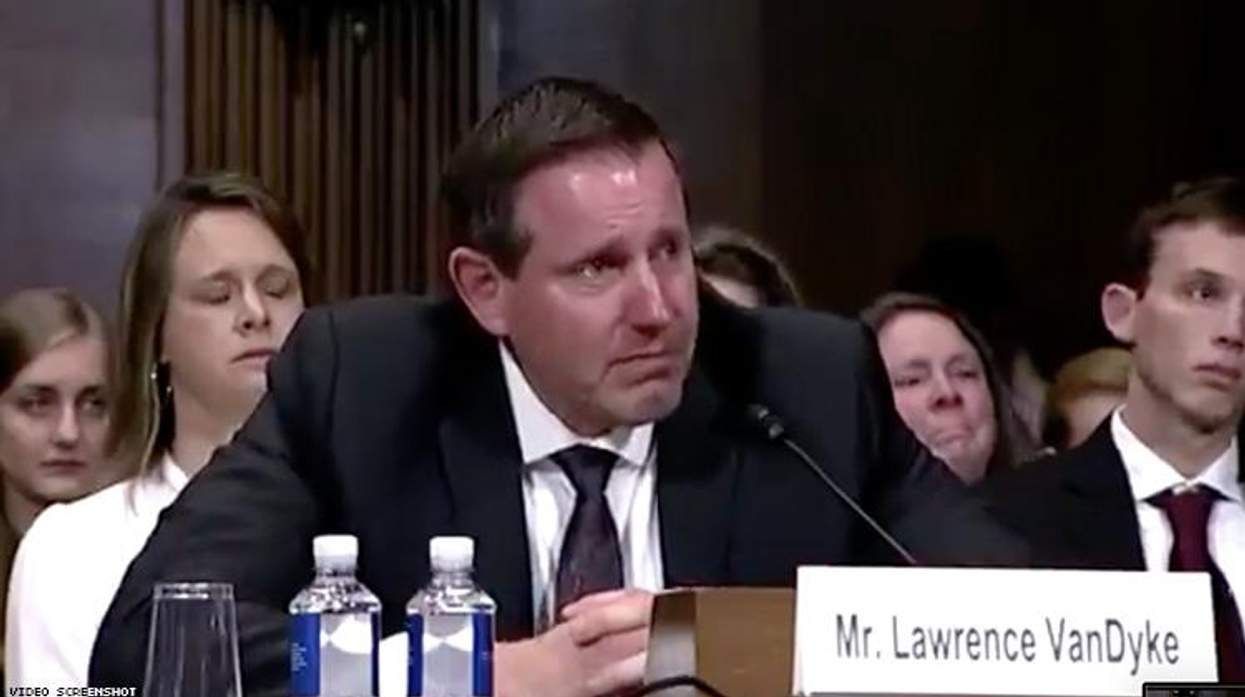Lawrence VanDyke, one of Donald Trump's nominees for the U.S. Court of Appeals for the Ninth Circuit, teared up during a Wednesday hearing when asked if he's anti-LGBTQ.
The American Bar Association had rated VanDyke, a former state solicitor general in Montana and Nevada, as "not qualified" and mentioned in a letter that people interviewed by the organization "raised concerns about whether Mr. VanDyke would be fair to persons who are gay, lesbian, or otherwise part of the LGBTQ community." The letter continued, "Mr. VanDyke would not say affirmatively that he would be fair to any litigant before him, notably members of the LGBTQ community."
At a Senate Judiciary Committee hearing today, Sen. Josh Hawley, a Missouri Republican, asked VanDyke if that was true. "I did not say that," VanDyke said tearfully, according to the Washington Blade. "I do not believe that. It is a fundamental belief of mine that all people are created in the image of God, and they should all be treated with dignity and respect." Hawley called the ABA letter "a shameful exercise in political bias."
However, VanDyke does have an anti-LGBTQ record. In 2004, when he was a student at Harvard Law School, he wrote a commentary piece opposing marriage equality, saying that legalizing same-sex marriage "will hurt families, and consequentially children and society." Two Democrats on the committee, Sen. Patrick Leahy of Vermont and Sen. Catherine Cortez of Nevada, quizzed him on that, and he responded that his views had changed and that no matter what, he would follow the law and not his personal opinions when hearing cases as a judge.
Then in 2013, as Montana solicitor general, he signed on to friend-of-the-court briefs supporting state bans on same-sex marriage and the Defense of Marriage Act, which denied federal government recognition to such marriages. The same year he also joined a brief arguing for the right of a New Mexico photography business, Elane Photography, to refuse services to same-sex weddings. If the photographer's case went to the Supreme Court, he wrote at the time, it "could be very important in establishing that gay rights cannot always trump religious liberty." The high court ended up not taking the case.
When Sen. Richard Durbin, an Illinois Democrat, asked VanDyke about that case, the nominee pivoted to another case he said was one of his favorites, Christian Legal Society v. University of California, Hastings, which involved whether the society could exclude LGBTQ students and still be officially recognized by the university and receive school funds.
"It was a case involving LGBTQ rights and also involving religious liberty, and I'm so happy to have the role that I had in that case because the position we were in -- it was illustrating that there doesn't have to be a conflict," VanDyke said, according to the Blade. But the paper pointed out that even though the group he represented was called Gays and Lesbians for Individual Liberty, its position was that the society had the right to discriminate against LGBTQ people. The Supreme Court ruled against the society.
People for the American Way, one of several progressive groups opposed to VanDyke's confirmation, said its position remains the same despite the nominee's reaction today. "Lawrence VanDyke is not the victim here," Paul Gordon, the organization's senior legislative counsel, told the Blade. "The victims are the millions of LGBTQ+ people who have shed tears over injustices we have endured. Let's just say Lawrence VanDyke's record on LGBTQ rights speaks for itself, and that along with the rest of his record remains disqualifying."
Another nominee who went before the committee today was Patrick J. Butamay, a gay conservative who is also up for a position on the Ninth Circuit. While the hearing proceeded more quietly for Butamay than for VanDyke, both nominees did face opposition from senators from states in the Ninth Circuit, which covers Alaska, Arizona, California, Hawaii, Idaho, Montana, Nevada, Oregon, and Washington.
Neither of California's U.S. senators, Dianne Feinstein and Kamala Harris, has endorsed Butamay. Feinstein said today that she thinks Butamay does not have enough experience to be a federal appeals judge, the Blade reports.
"This is the fourth time since President Trump took office that the majority has moved forward with a California Ninth Circuit nominee who does not have the support of Sen. Harris or myself," Feinstein said. Traditionally, the Senate did not proceed with nominations of judges who don't have the endorsement of their home state's senators, but it no longer adheres to that practice.




































































Charlie Kirk DID say stoning gay people was the 'perfect law' — and these other heinous quotes